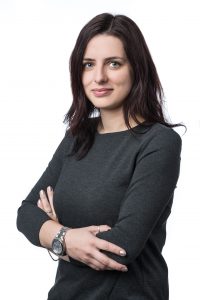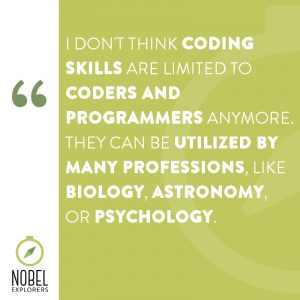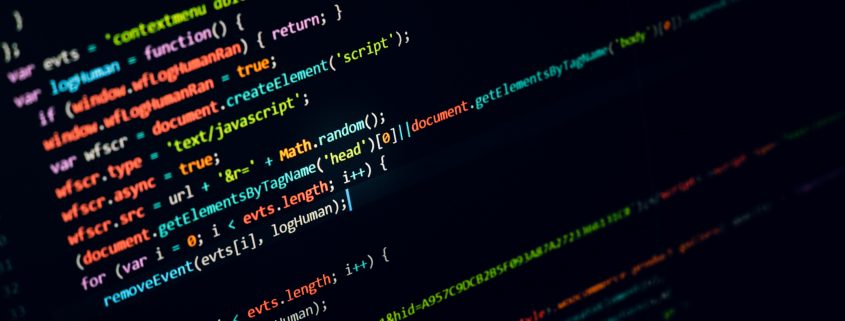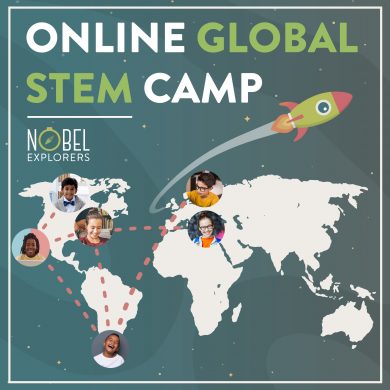Nobel Explorers’ Projects – Explained By Our Hard Skills Specialist
Yours truly had the pleasure of talking with Nobel Explorers’ hard-skills specialist a couple of days ago. I wanted to find out more and to give you, dear reader, an exclusive peek into Nobel Explorers’ story, programs, and all the benefits your child can get by signing up for them.

Aniko, Nobel Explorers’ hard skills specialist.
Hey Aniko! Thank you for finding the time to talk to me. First of all, could you tell our readers what it is that you do in Nobel Explorers?
I am a hard-skills team lead, and I’m also the content creator and instructor of the Coding and Web Design project. Basically, this means that I am the person responsible for the content of the projects in the sense of all the technical skills, how much coding goes in, how the content will be organized, etc. Of course, for different projects we have different developers who tackle their specific area of expertise, and I oversee and coordinate to make sure everything is aligned with the way we do learning in Nobel Explorers, with the way we do PBL (project-based learning), and with our overall goals in the team. In terms of my work on the Coding and Web Design project, I am the person who does the content, chooses the materials, who works with the Explorers, who guides them on their journey to create their first website, to code it, design it, to make it come to life and share it with the world.
That’s quite a lot of work! I’m wondering, how did you get into STEM? Could you share a little bit about your educational background with us?
Well, this is a tough one. My background is quite versatile, and I strongly believe that in 2018 coding is no longer a life path on its own, but a required skill for any type of work that you do, and I don’t think coding skills are limited to coders and programmers anymore but that they can be utilized by many professions. One of the reasons I’m saying this is because my starting point and university education set off as linguistics, which is a social science. I got into coding by attending a program really young, but other things got in the way and I stopped pursuing that side of my interests. Then, somewhere along the line, I realized that there’s a way to combine linguistics with the coding that I had been neglecting, and I started working in a field called computational linguistics or natural language processing. This basically meant that I was working with natural language data, but applying artificial intelligence and machine learning algorithms to work with these kind of things. So this was my entry point into coding. I realized there are so many things I can do, and I also had this visual side of my interests where I really liked to create beautiful things, so it was like – ‘Okay, I know Python already from artificial intelligence and there’s Python in web development, so what can I learn in web development further than this?’, and it became kind of a side interest, so now I have two parallel careers, or maybe even three! (laugh)

Like a side career of a side career! (laugh) You’ve mentioned just now that you don’t think coding is limited to programmers only anymore. Which other professions do you think can benefit from coding?
We’ve seen a lot of professions advance from the automation that programing brings. You can automate everyday tasks and make your life easier in any profession. Some of the professions that I have seen coding bring huge benefits to are biology, astronomy, and many more. Oh, there’s psychology as well! There are programming languages developed for stats, for getting information out of data.
Good point – I remember working with those during my university years. In your opinion, why is it important to be knowledgeable about STEM? What makes STEM so crucial in today’s society?
I think there are several aspects to this. I think coding will become a tool to facilitate our work and enable us to do more things in the future and do them better, more precisely. There are some things computers are really good at, and some things humans are really good at, and I don’t think… There’s often this fear that computers will replace us because they do better math, but I still think that there’s a human component to whatever we do and that we will be dared to use coding skills and programing and automation to our benefit, to enable us to do more and do better.
Since you’ve touched on the topic of programming and math, I have to ask – Do we need some prerequisites in order to start coding? Do we need to know math, for example? Or can anyone learn how to code?
I don’t think there’s a set of requirements. Coding is a wide field, so if you’re not really good at math, you can probably find an area that relies more heavily on logic, functional programming… In that sense, you will use some concepts from math, but it won’t necessarily be calculus or algebra that’s needed for it. Even in areas like machine learning where algorithms rely heavily on some concepts from math, there are ways that the code is organized so that you can actually use it and do amazing stuff with it without an understanding of the high-level math concepts that are behind those algorithms.
That’s good to know! I’m wondering, what drew you to Nobel Explorers in particular?
Nobel Explorers was one of those things that felt right from the first moment. I loved the company story, I loved the motivation behind it, I could really resonate with the long-term vision. As time was passing by, I felt like I was discovering all these new layers of Nobel Explorers that I did not see initially or that have developed in the meantime, and it has always been a positive surprise. There are always new challenges ahead of us, but we have an amazing team with versatile backgrounds and experiences, and there is no way we don’t come up with a solution if we put our heads together.
Could you tell us a little bit about the programs?
NE programs are designed as a way to engage Explorers, and they are conceived around something called PBL (Project-Based Learning), which means that the way we learn and the way we teach in NE is a really hands on experience. So there is not a lot of theory, not a lot of teaching where everybody’s just listening to one person sharing the knowledge, but we have real-life tasks with real-life values, and everything our Explorers learn is focused towards achieving a certain goal. So you will never code just for the sake of coding, you will code to create a website, to solve a real-life problem, and the one thing we really make sure happens is that the project does not end with the Explorers’ time with us, but that they create something that is maintained in the real world. For example, once they create a website, that website is accessible to everyone, it’s spread to the community, and they can even work on it further if they wish to.
What is it that makes Nobel Explorers’ programs different from other projects you’ve worked on?
I think one thing that Nobel does in an excellent way is to try different approaches to education. We constantly go through testing and adapting to make sure that we’re giving and sharing the knowledge in a way that is fun, that is accessible, and that has real value. I’m not sure if all of these components are unique and if no one else does them, but definitely the combination of all the different aspects is definitely unique to us. The fact that we integrate teamwork and collaboration in an international environment – I think that’s the magic recipe and the secret sauce.
You are a hard-skills specialist, but I assume you work very closely with the other people in the team. Could you tell us what made you include soft skills as well in your program? What makes them so important?
As I said, coding and STEM are only tools. Coding is a skill you can acquire, but in order to create really good, unique things that are amazing, always takes the joint effort of a team. And soft skills enable us to collaborate and communicate and share ideas in a way that ensures they are being heard which, in turn, ensures that we can bring our knowledge together and not just work as individuals. Because as a team, we can always achieve more.
So kind of like Steve Jobs didn’t start out alone but he had Steve Wozniak with him?
(laugh) Something like that.
What is your message for parents who are thinking about joining the NE programs but are not sure about it?
If you are thinking of NE vs. another program, apart from us having amazing content, the outcome is that in a really short time, we teach kids or anyone working on our projects a lot of things. For example, in the Coding and Web Design project, we manage to organize content that takes somebody who didn’t know how to code, and in 13 meetings, or 26 hours of time with us, they learn to code a website from scratch, organize it, make it visually appealing, and publish it on the web. If you ask me, that is pretty amazing.
Become a Nobel Explorer today or contact us if you have questions about our projects.





Leave a Reply
Want to join the discussion?Feel free to contribute!